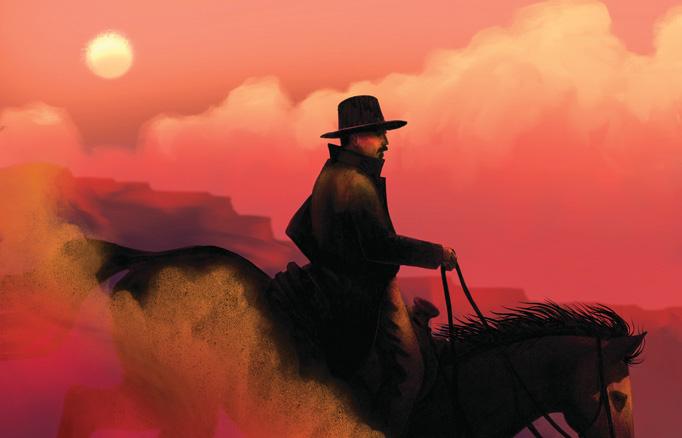Prøve GULL - Gratis
HOW THE WEST WAS LONG
The New Yorker
|July 08, 2024
“Horizon: An American Saga—Chapter 1.”

Westerns are an inherently political genre, for the obvious reason that they depict (or distort or interrogate) American history. But they are also political in that they show the birth of the polis itself—the institutions of modern urban society, with their laborers, clerks, merchants, teachers, sheriffs, entertainers. Where philosophers from Plato to Rousseau sought to imagine the development of civil society from first principles, the makers of Westerns—John Ford, Howard Hawks, Raoul Walsh—showed it being created from the ground up, by hands-on labor.
Unlike the blank pages awaiting philosophers’ fancies, the American West was already inhabited, and the Indigenous peoples living there had well-developed social orders, so Westerns are, unavoidably, tales of conquest and subjection. Westerns, which emerged around the dawn of the twentieth century—while the westward expansion that they depicted was still going on—have often served to whitewash a bloody past and ease the mainstream conscience. If the genre has a particular bent toward mythology, it’s because this episode of American history admits of no honest telling without shame and dishonor. The Western, at its worst, is a series of convenient lies, but the genre also encompasses works that look frankly at prejudice and at crimes against humanity. In John Ford’s “The Searchers” (1956), an Indian-hating warrior goes into self-imposed exile; Robert Aldrich’s “Apache” (1954) dramatizes the heroic struggle for freedom of Geronimo’s subchief, Massai.
Denne historien er fra July 08, 2024-utgaven av The New Yorker.
Abonner på Magzter GOLD for å få tilgang til tusenvis av kuraterte premiumhistorier og over 9000 magasiner og aviser.
Allerede abonnent? Logg på
FLERE HISTORIER FRA The New Yorker

The New Yorker
A WORLD APART
\"A Big Bold Beautiful Journey.\"
6 mins
September 29, 2025

The New Yorker
CINEMA PARADISO
How Bologna became a guiding light of the film-restoration world.
25 mins
September 29, 2025

The New Yorker
DON'T SAY IT LIKE THAT
A legendary usage guide is turning a hundred.
18 mins
September 29, 2025

The New Yorker
R.F.K., JR.: A DAY IN THE LIFE
Upon waking each morning, I open my drapes, remove the tinfoil over the windows, and stare directly at the sun for thirty to forty-five minutes until everything goes white and I can no longer see, which is when you know it's working.
3 mins
September 29, 2025

The New Yorker
NO WAY OUT
In Thomas Pynchon's \"Shadow Ticket,\" all the ends are loose.
13 mins
September 29, 2025
The New Yorker
Rivka Galchen on Raymond Carver's "Elephant"
The structure of \"Elephant,\" one of Raymond Carver's last stoties, is simple, but the emotional effect is outsized, numinous, convincing, and comic.
3 mins
September 29, 2025

The New Yorker
ALL THE PRESIDENT'S ENEMIES
Following the tragic death of the conservative activist Charlie Kirk, the line between eulogy and blame wore swiftly and predictably thin.
4 mins
September 29, 2025

The New Yorker
YOU PEOPLE
Antisemitism and its tangled meanings.
14 mins
September 29, 2025

The New Yorker
AFTER THE FLOOD
Ian McEwan casts the climate crisis as a story of adultery.
7 mins
September 29, 2025

The New Yorker
UNREASONABLE
The nearness of bees, and of other things that agitate most people, calms me. My father had three daughters and he ate watermelon with slices of cheese on the porch and he said once, over watermelon, that he was very lucky to have three girls: one beautiful, one kind, and one intelligent.
24 mins
September 29, 2025
Listen
Translate
Change font size

